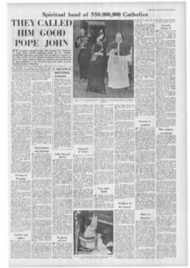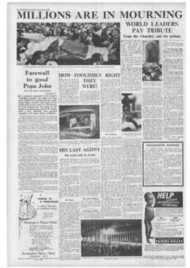Page 3, 7th June 1963
Page 3

Report an error
Noticed an error on this page?If you've noticed an error in this article please click here to report it.
Tags
Share
Related articles
Speakers Heckled At Unity Meeting
Ecumenism As A Way Of Life
Room For All Honest Men In The T.u.'s
Cardinal Met With Protests At St. Paul's
Reunion Prospects
REUNION NEEDS MORE THAN GOODWILL
BY ARCHBISHOP HEENAN OF LIVERPOOL, IT would be a pity if Catholics were to become bored by the subject of Christian Unity. If they do so it will be partly the fault of those who, in all goodness of heart. have tried to make the problem look simple. There are some who evidently think that there are no great theological issues between Christians which a little good will cannot resolve.
Others. on the contrary, adopt the extreme view that divisions run so deep that it is futile for Catholics to attempt any dialogue with Protestants. The fact is, that among Christians of all denominations good will is abundantly present. The differences, nevertheless. are formidable. Christ alone can unite his followers. Ecumenism means, in effect, humbly admitting the mighty power of God's grace to achieve the moral miracle of Christian Unity.
The ecumenical movement is bedevilled by confusion with reunion. The ultimate goal, of course, is the union of all Christians in One Holy Catholic Church. Those Catholics suspicious of the whole ecumenical approach seize on this to contend that, since the One Holy Catholic Church already exists, it is a waste of time (if not actually dishonest) to search for unity. To carry on a dialogue-the argument runs-is to give those outside the Church false hope of a possible compromise through which a new formula of faith will be found.
WITHOUT TEARS
No sound Catholic theologian, however ecumenically minded. has ever merited criticisms of this kind. All agree that Catholic dogma is irreformable. Catholic ecumenists maintain, nevertheless, that our doctrine if properly presented, will eventually win the assent of all Christians. For ignorance of Catholic doctrine is to be found in the highest places. Few Protestants know what, for example, the Church really teaches about Our Lady. They often imagine that the apparitions at Lourdes or Fatima are as much part of our doctrine as the Virgin Birth. It needs patient interchange of views to correct such misconceptions and present the teaching of the Church in all its attractive beauty. The dialogue is the providential opportunity
given to our age of consorting with fellow Christians to discuss truth without rancour and with no attempt to humiliate opponents or score controversial victories, No responsible scholar. Catholic or Protestant, holds that the ecumenical movement is capable of achieving speedy agreement among Christians. This may take a hundred years or more. But all believe that it will be done by Almighty God in His own time and in His own way. The immediate and eminently worth-while object of ecumenical effort is to enable Christians to understand and so to cherish each other.
Christian Unity has recently received a set-back through the wide publicity given to the startling views of certain theologians. Cambridge undergraduates, for example. doubtless found attractive the idea of sinless and even virtuous fornication of which one 1 e c ture r spoke. Here was Christianity not only without religion but also without tears. But these are only passing obstacles to
ity.
It does. of course. embarrass Catholic ecumenists when professors of theology contradict the teaching of Christ and remain officially unrebuked. But, on the Catholic side, we are also guilty of causing confusion. Visiting Catholics, sincerely believing that they understand the religious
position in England. occasionally, lead our non-Catholic friends to assume that the Church has two voices-one for use at home and the other abroad.
UNCHARITABLE
As we become better acquainted with the separated brethren our affection is bound to grow. If he had ever been tempted to accuse them of consciously resisting truth, the Catholic ecumenist soon perceives their utter sincerity and personal dedication to Our Lord. Regarding authority as a fundamental of Faith, Catholics find it hard to credit that other Christians with quiet conscience can be content to remain outside the Catholic Church. We learn by experience that others regard our premises as false.
For most separated brethren regard themselves as already members of the Catholic Church. The kind of authority by which we rightly set such store is for them an offence against human liberty. This is a view held not only by fanatics who accept the myth of Rome's tyranny but even by the wellinformed who, understanding our position, firmly reject it.
Thinking for the moment only of the Church of England, we can see how Catholics, in turn, can be misled. We may he inclined to mock at the comprehensiveness of Anglicanism. But it is important to appreciate that Anglicans themselves, far from being embarrassed or defensive about it, rejoice in this very comprehensiveness and regard it as one of the glories of the Established Church.
This lack of authority could lead to the multiplication of sects and even to the ultimate disappearance of this form of Christianity. But we do well to realise that other Christians are usually undisturbed by the variety of creeds within their own communities. They are tolerant of divergent opinion and regard it as uncharitable and unchristian to call a man a heretic and un-church him,
COURTESY
We have to be on our guard against making harsh judgments of other Christians. It is our veneration for authority which so easily betrays us into condemning all who disagree with us. We sometimes forget that objectively false Opinions can be sincerely held. A person is contumacious only when he stubbornly resists lawful authority. But a Protestant may in good faith recognise no spiritual authority on earth-that is the essence of private judgment.
Our fellow Christians look elsewhere for authority. They may took to the Bible or to the historic creeds. They do not believe that there is apy living, infallible authority on earth to-day. It is their view that at a certain point in history general councils of the Church ceased to speak with divine authority. This may seem strange to Catholics but it is the honest view of non-Catholics. It is not by avoiding them but by coming closer that we can appreciate their outlook and help them to understand our own.
One of the great virtues of nonCatholic clergy is their great courtesy. A striking example is the recent book TI-IE CHURCHES AND CHRISTIAN UNITY*. The editor, Mr. Bevan. not only put the long article on the Roman Catholic Church in first place but also invited Father Leming, S.J., its author, to write the whole of Part One of the book itself. This section is entitled "General Problems of Ecumenism"
WORK HARDER
Any Catholic who doubts either the value of the ecumenical movement or the sincerity of nonCatholics engaged in it should read this symposium. It begins with the prayer of the Abbe Couturier beautifully translated by Dr. Allchin. The main denominations present their points of view in essays by their leading theologians. There is no need to commend the chapters by 'Father Leming. None better qualified than he to present the Catholic outlook.
The chapters by the other writers are equally clear and competent. Their longing for true unity among Christians illuminates every page. This is a publication which will give heart to all who pray for Christian unity. It shows what confidence our separated brethren have that tbey will achieve unity among themselves. The big question is how long will it take before Catholics and non-Catholics can agree on what ia meant by the Catholic Church.
It is salutary to be reminded by this book that non-Catholic ecumenists are hot, am we are inclined to imagine, preoccupied by thoughts of reunion with Rome. You will look in vain in the index for the names of Pope John or Cardinal Bea. Almost all quotations are from contemporary ecumenical authors. A Lambeth Conference is quoted as a Catholic book might quote Trent, Ephesus or St. Augustine. This is significant of our whole difference in theological approach. Protestants were building up a theology of ecumenism before most Catholics had ever heard of the expressionat least in the context of Christian unity. We have come late to the field and must therefore work all the harder until the harvest.
*Edited by R. J. W. Bevan, and published by the Oxford University Press. pp. 263. 25s.
blog comments powered by Disqus















